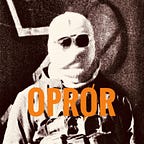Wales is often forgotten about when looking at independent movements in the UK. Yet, the country has a history of radical independence attempts. With the atmosphere of home rule growing after the creation of the political party Plaid Cymru in 1925.
The desire for Welsh sovereignty hasn’t just been conducted through political means. The 20th century saw nationalists take a more radical stance in their aspiration for sovereignty. These attempts culminated in the formation of Free Wales Army and Meibion Glyndŵr along with several other more radical groups.
The Free Wales Army was formed in 1963 in the town of Lampter by charismatic leader Julain Cayo Evans, yet the groups operations only began in 1965 when they emerged at a protests against the construction of the Lyln Celyn reservoir. The group courted media attention, declaring they had the support from loyal millionaire backers and performing well rehearsed and media friendly manoeuvres involving small arms and explosives in the Welsh countryside.
The Army’s motto was “Fe godwn ni eto”, Welsh for “We will rise again”. Its crest was Eryr Wen, a stylised white eagle mounted on dark green shield, with the flag of Wales at the top left hand corner. The eagle represents the eagle of Snowdonia, which in Welsh mythology is said to protect Wales, mentioned in the poem Mab Darogan. This 13th century poem states; “Myrddin’s prophecy is that a king shall come with heroism from among the Welsh people. Prophets have said that generous men shall be reborn of the lineage of the eagles of Snowdonia.” The modern symbol itself was designed by Harri Webb, a Welsh republican poet who edited The Welsh Republican in the 1950s.
The groups claimed to have strong links with Basque separatists and Irish republicans, reports go as far as to suggest that the group may have received training abroad and weaponry from the latter.
They stood up for the families of the vicitms of the Aberfan disaster in their attempts for compensation, marching in home made unifroms in historic sites such as Machynlleth.
Yet, although appearing to represent an army, the group wasn’t taken seriously by the media, despite a high profile interview by David Frost, which did give them more prominence.
The group, although compared to the other more radical nationalists groups whom had conducted bombing campaigns, the free wales army where small fry and for a large part innocent. Yet their high profile nature meant they where an easy target for the government, whom faced pressure to resolve the issues of radical welsh nationalism as the investiture of the Prince of Wales grew closer. In 1969 nine members of the group where arrested and charged with public order offences. Weak evidence, mainly collected from journalists whom had covered the groups activities meant that only Cayo-Evans and David Coslett, the groups second in command where convicted and spent 15 months in jail.
Meibion Glyndŵr, translated in English to the sons of Glyndwr, was another group in the later strategies of the 20th century vying for violent welsh nationalism. Ardently opposed to the loss of welsh culture and language and holding a grudge against the mainly wealth English establishment whom caused the housing crisis through the purchase of holiday homes.
The group came to eminence in 1979 when they begun a campaign of attacking and firebombing a number of English owned holiday homes. Over the next decade over 220 English owned homes where burnt or destroyed as a result of their actions.
The groups actions got more radical at the end of the 1980s. In 1988–89: Meibion Glyndŵr declared that “every white settler is a target”. The group also placed incendiary bombs in Conservative party offices in London and estate agents’ offices in London, Liverpool, Sutton Coldfield, Haverfordwest, Carmarthen and Llandeilo.
In 1990 Poet and priest R. S. Thomas called for a campaign to deface English-owned homes. Three years later a member of Meibion Glyndŵr, Sion Aubrey Roberts, was jailed for twelve years after sending letter bombs to Conservative politicians.
Although Wales has a distinctive culture away from the UK, and many Welsh people identify first as Welsh before British, this sentiment hasn’t spread to a desiring independence.
Polling across the last two decades have shown that consistently around 10–12% of people polled have desired Welsh independence. In 1979, the Welsh electorate voted against the creation of a Welsh assembly with the “no” vote gaining a majority of 80%.
In 1997, a second referendum on the same issue secured a “yes” by a very narrow majority (50.3 per cent).
The National Assembly for Wales (Cynulliad Cenedlaethol Cymru) was set up in 1999, under the Government of Wales Act 1998. The National Assembly has the power to determine how Wales’ central government budget is spent and administered. Yet, the UK parliament reserves the right to set limits on the powers of the Welsh Assembly.
